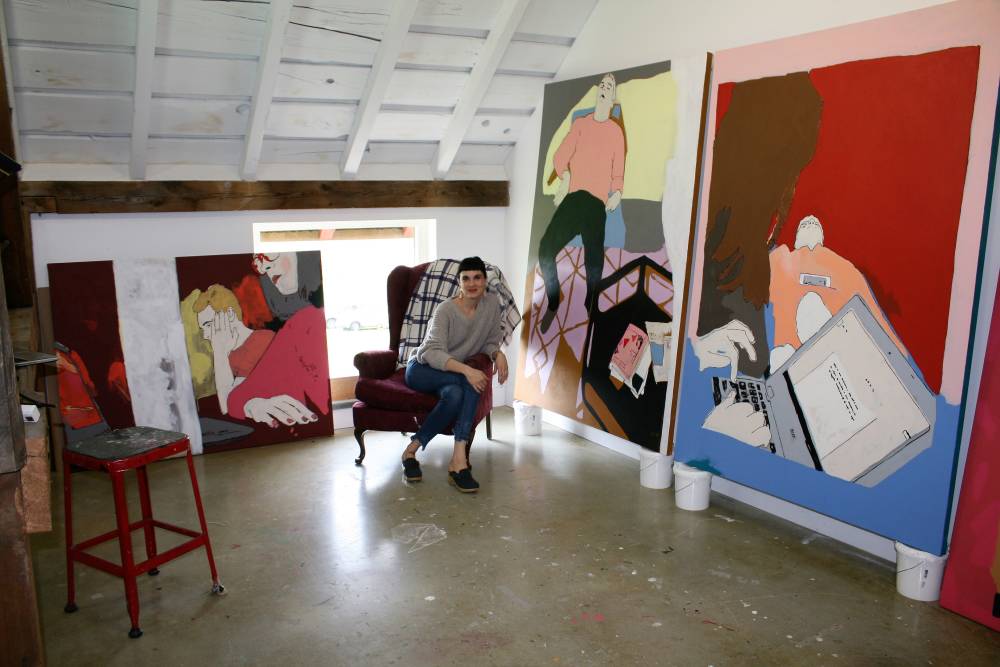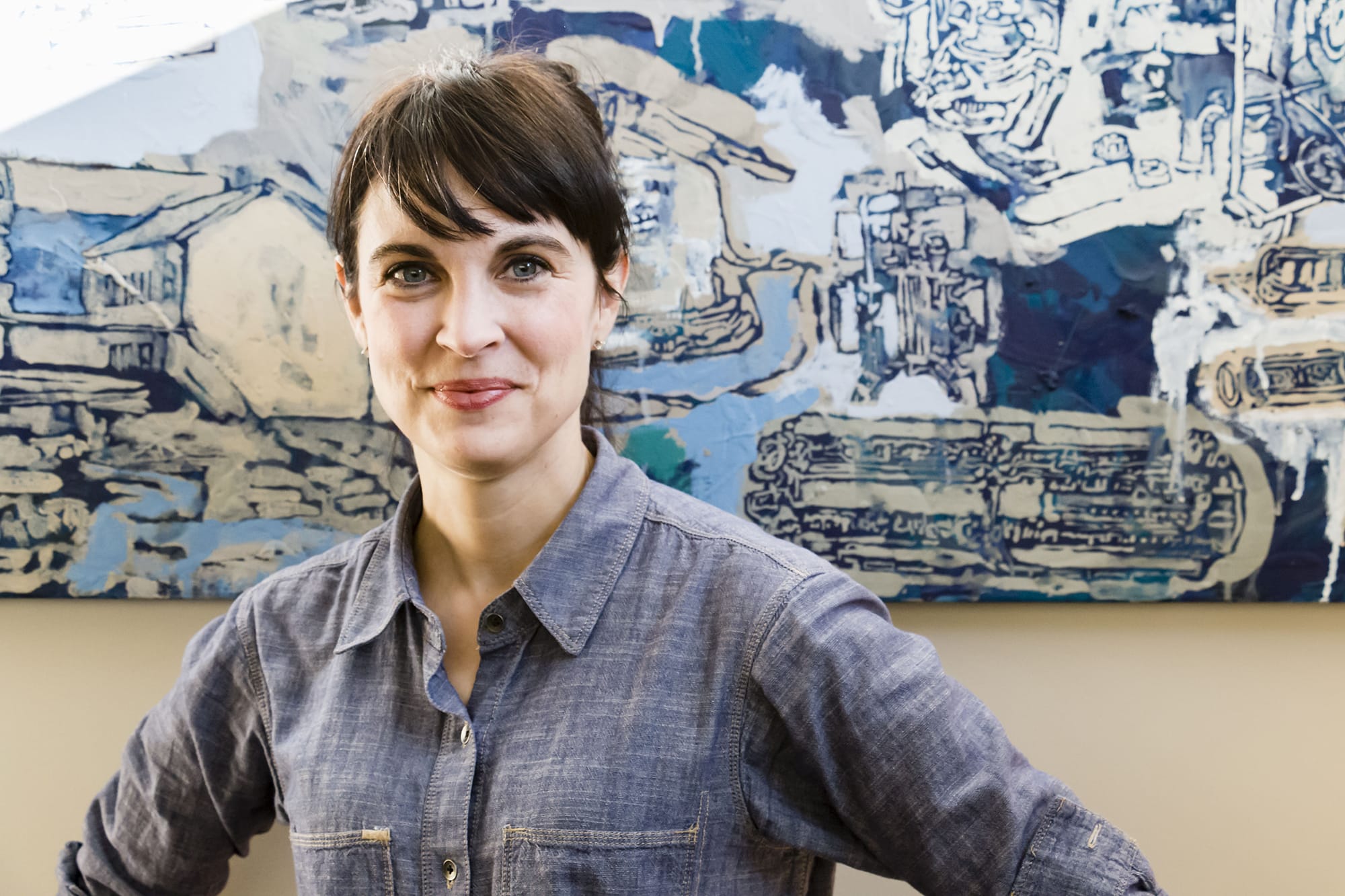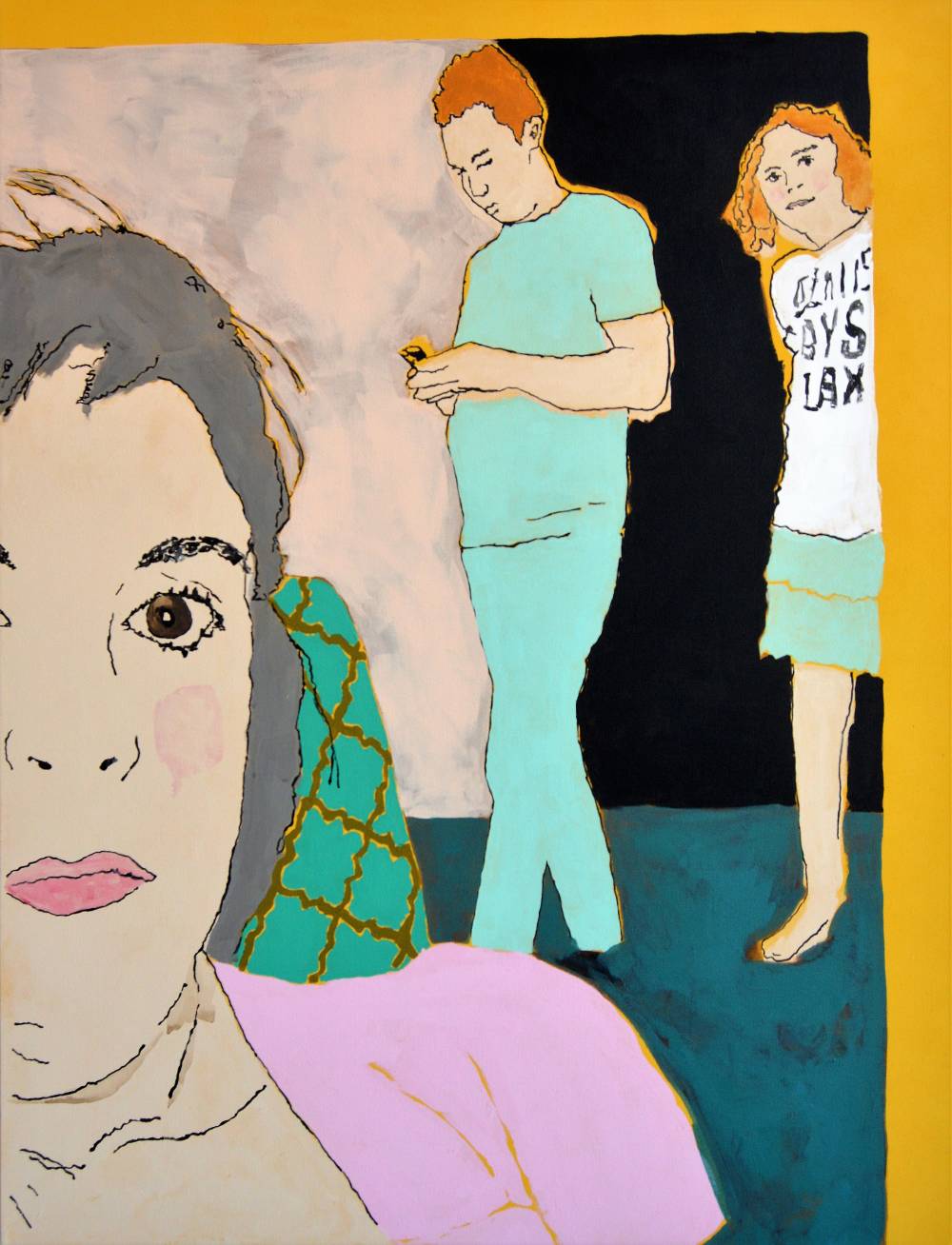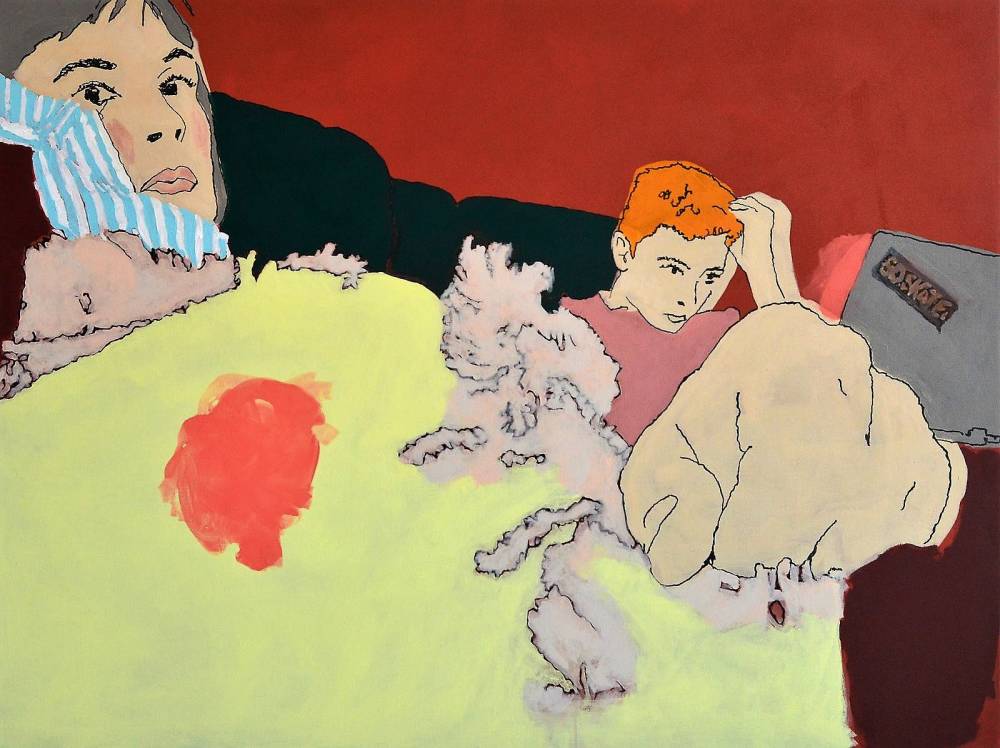Doesn’t time go so much faster as a parent? It does. I think especially with kids, you think, gosh they’re gonna be little forever, and then you turn around and I have a child that’s going to be in high school next year.
You live in Dayton now, but you grew up in another part of Ohio, right? Northeast Ohio. Newton Falls. It’s a small town, less than 5,000 people.
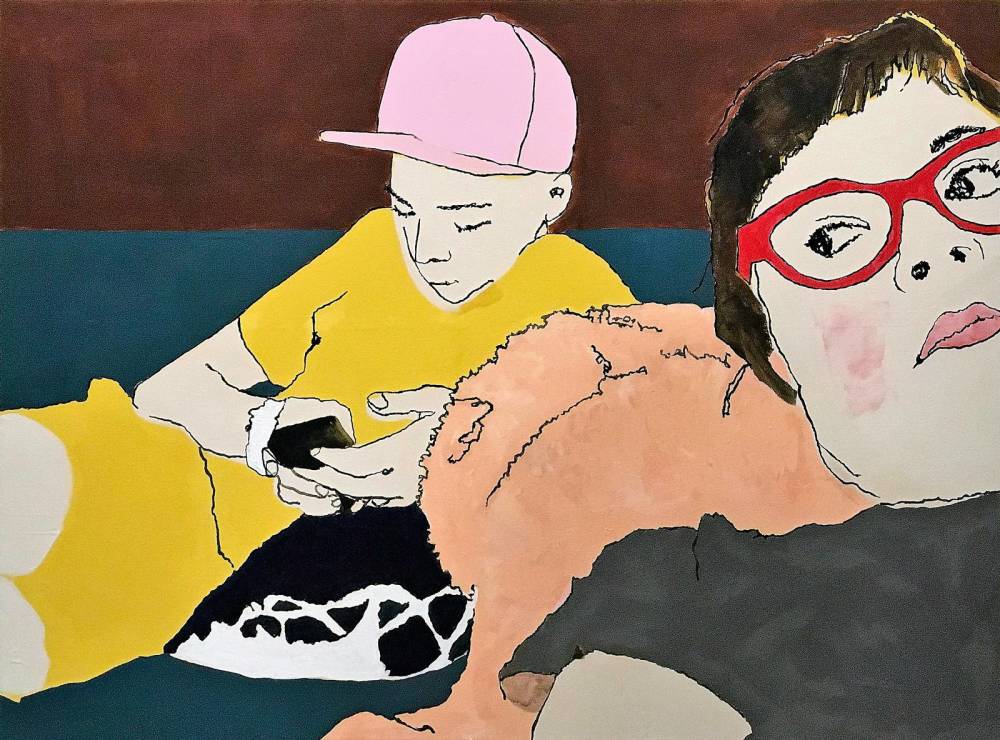
And what did your parents do when you were a kid? My mom was a teacher and my stepfather was also in education.
Were the arts a part of your life as a kid? I think we probably visited museums and art museums, and looking back I’m not sure many of my friends did that kind of stuff. I had an interest in art, but we only could take one or two classes in high school. So I wasn’t really exposed to a lot at a young age. I knew I was interested in it, I just didn’t know anybody that was an artist. I think that I came to it later in life, in college, where it actually became of interest to me to make it into a career.
Did you go to school for art? Yes. My degree is in painting and drawing. I went to Ohio State, but that’s only after resisting art as an actual major, and trying to think that I was going to be some sort of scientist and studying the sciences. Then I realized that wasn’t for me. I had to take an art class, so I ended up round-about taking all of my studios together pretty late in college. I had already taken all of the other requirements. I was sort of figuring out what to do next, and I became really interested in it. I had this really intense experience where I was doing four or five studios each semester, which is a crazy number of studios.
So you were trying to catch up? Right, trying to catch up. I thought I wanted to do something different and I changed my mind to get a degree in the arts. That’s kind of how it happened. I think there are a lot of people that were always interested in it, and that wasn’t my story.
You thought you were going to go into science? We had a really good science department in high school, and that’s something we had a lot of exposure to. You kind of know what a career path for that looks like. I knew that I did not want to teach, and being an arts teacher didn’t have a whole lot of appeal to me, so I didn’t know what other path to take, being interested in making stuff.
I was clearly interested in art, but it took me awhile to figure out what path to take and how to go about doing it. That was true even after getting my degree. I worked in the arts, and I kind of let my studio practice lapse for about a decade. I had children, and came about it maybe five years ago again. I have been working pretty fervently to get things going and get a practice with a sort of regularity going for myself.
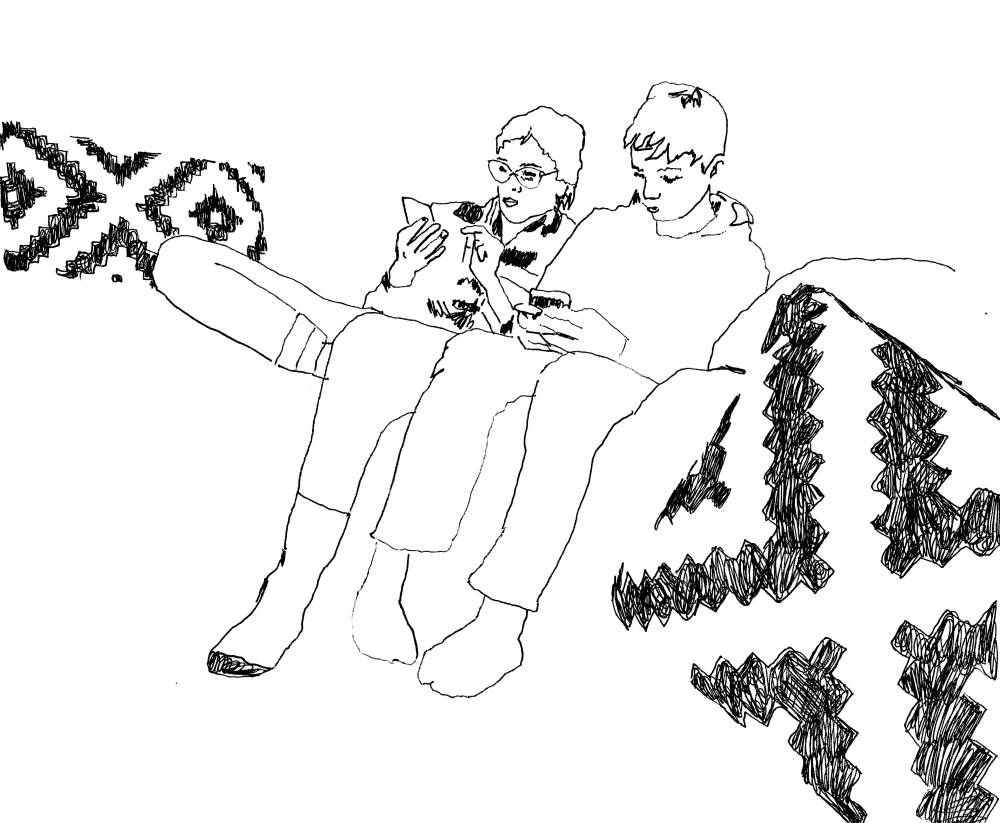
What were you doing for those ten years other than having kids? I was interested in making art and I showed a little bit, but really I was working in the arts. I worked for the Wexner Center for the Arts in Columbus, a contemporary arts center. I thought, well, I’m getting to be near the arts, and so I just didn’t make time for a studio practice for myself. I thought, this is good enough. I get to be near it.
Then I did have children, and I just felt so drained. I kept saying, well, I’m going to come back to it. This is something I’m really going to come back around to. When they get in school, or… I always had a changing deadline. So a few years ago, maybe five or six years ago, I said to my husband, “When the kids are back in school…” And my husband’s like, “The kids are in school. When are you going to do this? If you want to do this, you should do it. You should just quit everything and pour yourself full on into it. There’s just no time more to waste about it. And if this is something you want to do, you’ve got to make it happen.”
And so, that’s essentially what I did. I had a very part-time job. I quit that. And I’ve just been working in the studio trying to get my work out there, and get shown, and make sort of an arts community for myself here in Dayton.
So what was that conversation like, when your husband said, “Just do this?” I think I was stressing myself out. When you’ve got children, it can be a great excuse for not doing things, but what I needed to do for myself was show them what I could do, instead of what I don’t have time to do, and quit using that as a way to escape putting myself out there. He’s super supportive, and I’m really lucky to have that. He was able to kind of give me the gentle push that I needed to get back into things, because so much had changed in the ten years. There wasn’t social media then. Most people didn’t have their own websites and a lot of the information about applying to shows would be through weird fliers or word of mouth. Ten, 12, 13 years ago, never would I have known how to apply to a show in New York. Coming out of school, unless you had some connection and somebody told you about it, I didn’t know how to do any of that. So much had changed. It was a matter of figuring all of those things out, almost like I just had graduated from school in some ways.
“When you’ve got children, it can be a great excuse for not doing things, but what I needed to do for myself was show them what I could do, instead of what I don’t have time to do, and quit using that as a way to escape putting myself out there.”
I think that’s so interesting. We will use our kids as an excuse to not do what we really want to do, but really also it would be really good for all people involved if we just did what we wanted to do. I use that all the time. I’ll say, “Oh I can’t practice because he’s awake and playing in front of me. I couldn’t possibly get anything done with him around.” Then if I just take the flute out, it’s really no big deal, and he plays, and I practice, and it’s fine. But I tend to find ways to use that as an excuse, and now I’m finally talking myself into it, like, okay, well if you just do what you want to do in front of him, it’s actually really good thing for him to see. You want to show them that there are a lot of things happening in this world, and while you want to pay attention to them and give them the attention they deserve, they also have to know that they’re not the center of the universe. It’s important for them to see that I have things that I want to do and accomplish, and that I’m going to go for those things and put myself out there and do what makes me happy, but I’m there as your mom too, to give you what you need so that you can be happy as well.
I think it’s kind of hard because there is so much emotion tied to making sure they’re okay. I was a stay-at-home parent, and I think that I was just so focused on what their immediate needs were that I was able to push aside what some of my needs are to find success and happiness for myself. I do think that’s the difficult thing for a lot of people. To say, “Well, I also have needs, aside from what my children need.” So we need to meet both of these things. Sometimes we are just so selfless as parents that we just think, “Well I can’t give this to myself,” but I do think it makes me happier and a better parent to kind of do those things for myself instead of resenting that I’m always doing something for someone else.
It must be different approaching your work when your kids are a little bit older. How old were they when you decided to be a painter again? My daughter is in fifth grade now, so I think she was in kindergarten at the time. When I was first making work, my work was a lot different. It had to do with domestic life, but not them. Now my work has shifted so much to be about them and what’s happening in our family dynamic. Because they were so young when I started, I just feel like they just think that it’s normal. Sometimes my husband will say, “ Hey, see that painting of Frances, or that flier of a painting of Frances hanging up there? Most kids don’t have that experience.” We’re trying to point out that this is kind of an unusual experience, but they don’t know any differently. They’re like, “There are some weird paintings of me doing whatever hanging up over there…Oh that’s normal.”
How did you get the inspiration of making the work about mundane life? When I started making work again, I was really focusing on domestic life. At the beginning I was doing a lot of paintings of furniture, and I was thinking a lot about women’s consumerism and womens’ creative outlets. I’m in a neighborhood where there are a lot of parents that choose to stay home, at least one, part-time, and I was thinking about what kind of outlets people have for being creative. And so I initially had started with collecting paint from stay-at-home moms when they were done with some project in their house, and I would collect all this paint to repurpose it with my own sense of work.
There was always a focus on domestic life, but recently I’ve been focusing more on what immediately is going on, and because I do have a tween and teenager, I started to notice that there is a distance—intentional and unintentional—between me and them. They’re trying to establish themselves as their own people, and so I’ve been interested in that physical connection. We’re all in the same space, but also there is this disconnection between people in the house. Because of that, a lot of my work is stalking my family when they’re not paying attention. I use my phone, so they think I’m on Instagram or emailing somebody, but I’m really taking photos of them when they’re not paying attention.
Are most of the subjects in your work your family? Yes. It’s me and my husband, and my two children. That’s the focus of the work. It’s so specific to them, but it’s not a situation that most of us haven’t experienced: two people laying in bed and one’s looking at the phone, and one is staring off into the distance, or when I’m snuggling with one of my children on the couch and they’re on their laptop the whole time.
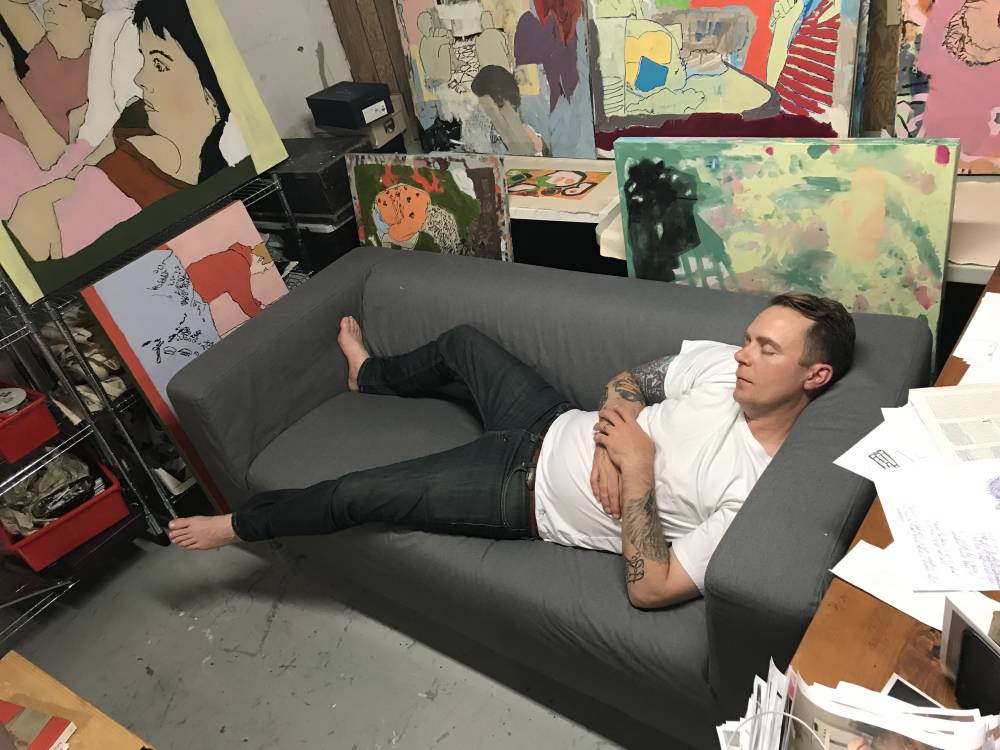
That’s what I think is so fascinating about looking at your work. I know this scene. I see this every day in my life, but who would think to make art out of it, because not only does it feel boring, but it’s something that we often shame: sitting on your phone or sitting on your computer, but you’ve turned it into something really beautiful somehow. The best description I’ve heard about distraction is that it’s trying to connect to too many things at once whether inadvertently or intentionally. That idea that we are in a family unit, but also he’s texting his friends and checking on something else, and there’s music playing in the background, and maybe somebody’s futzing with the tv, that’s kind of an interesting dynamic, especially when we have so much access to technology these days.
How has the business side of it been for you? The creation of a website and being on social media? What kinds have challenges has it given you, but also how has it helped you? I think it’s so interesting that with social media, you’re able to get so many more ideas out there, and have a critical voice. Here in Dayton, Ohio, I’m lucky to have a group of artists, where we get together and critique our work, but I think social media for me helps create an extension of that community. Working where I do in a small town in the Midwest, it can feel kind of isolating, and the number of opportunities are limited. You can connect with other people on social media, and that’s what I like the most about it. I had jobs previously putting together websites or doing social media, so that helped me prepare for doing it for my own business. I do tap into all of those skills that I used in previous jobs to do those things that I wasn’t so prepared for coming out of school. Because as much fun and as great as it is to make work, I personally feel like I’m doing a lot more of the business end of it right now, with proposals and grants and applications, and maintaining all these databases of information for myself. It’s kind of a struggle. It’d be great to just have 40 hours a week to just do the work, but it really gets cut into and that’s a challenge.
How do you manage that time? What does your day look like, where you can make sure to get the work done, but also market it? I try to rotate what I do every day. I work out of my house, and that’s been really convenient for me. I’ve looked into having a studio outside of the house, but honestly sometimes when I have only 45 minutes, I’ll go down there and mess around or futz with something that I’ve been struggling with. That’s great, instead of driving to a second location. Sometimes I get straight on the computer and start working on deadlines. I usually keep a running list of deadlines of things that I want to apply to.
Every day is different, but when my children are in school Monday through Friday, I have the same amount of time. Once three o’clock hits, usually I’m done for the day. I can usually work between eight and three, so I don’t get a full 40 hours a week, but in the evenings a lot of times I will do stuff on my computer. Or if I get motivated enough, I’ll work down in my studio. I’m just glad to have this consistent amount of time. It’s a little bit weird during the summer when they’re home for long breaks, but that’s basically how I structure my time. To use it as much as possible when they’re out of the house.
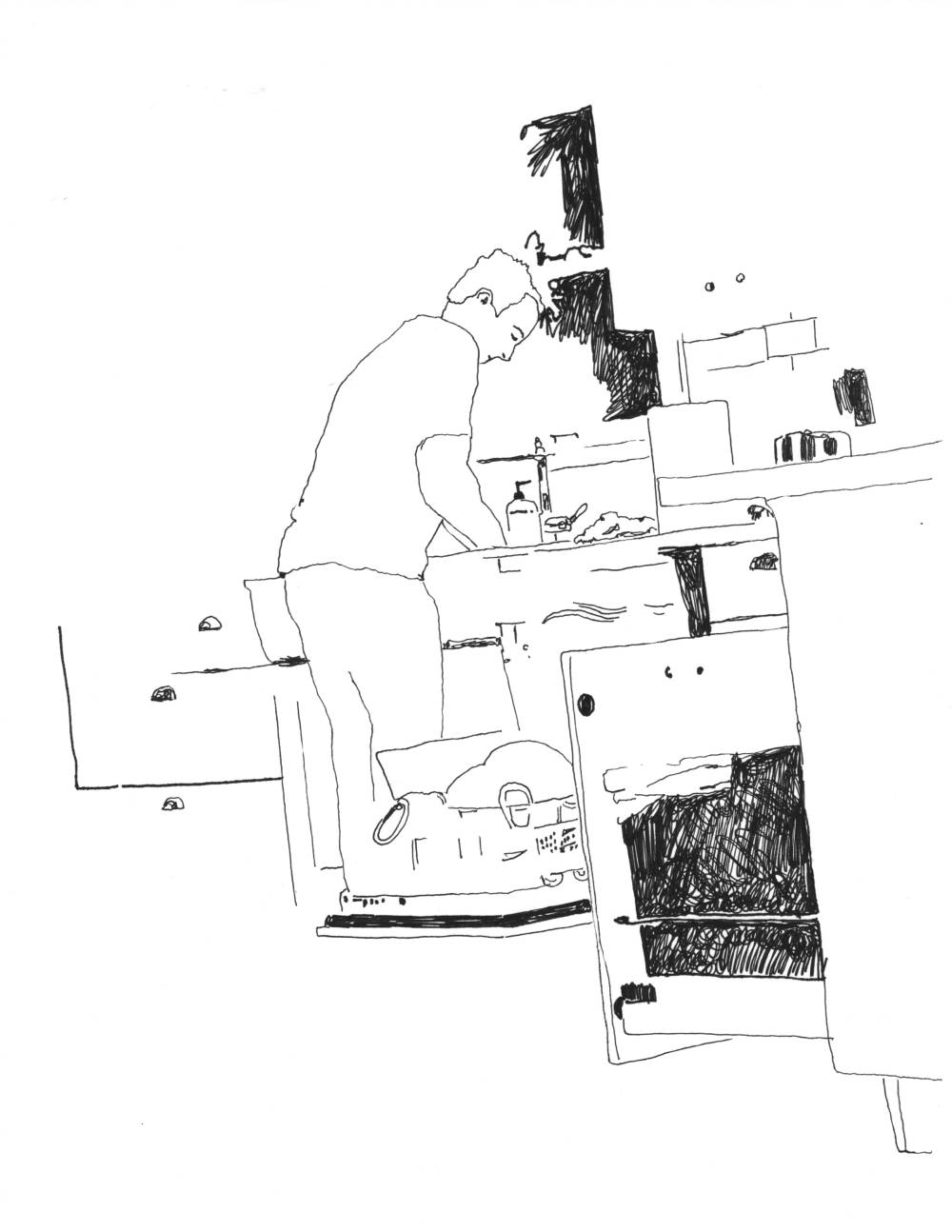
I’m just thinking back to what you were saying earlier: “Well, when the kids are in school, we’ll do it.” Well, it’s actually working out pretty well, because they’re in school and you can work while they’re gone. So then you have evenings at home with your family most of the time, right? Right. They come home from school at three o’clock, so we’re together all afternoon through the evenings, and then sometimes when they’re off to bed then I can get a little bit more computer work or something done, if I’m motivated enough.
Has it always looked like that since you started, or has it evolved? It’s evolved, because I initially was working in my studio and then I had a part-time job working 20 hours a week outside of the house. I was really working more on weekends, and I don’t do that so much anymore because I have the time now to work during the week. Weekends end up being more about family time or running errands and all that silly stuff that you do on the weekends. Baseball games and activities…
“I had a really hard struggle with quitting work to watch my kids and stay home with them. I was working for an arts non-profit, so it just didn’t make sense for us financially to hire childcare when the childcare was more than I would even be making working full time.”
Do you think you could have done what you’re doing now when your children were small? I don’t think I could have, and it’s more a personality thing or an anxiety/stress thing for me. I had a really hard struggle with quitting work to watch my kids and stay home with them. I was working for an arts non-profit, so it just didn’t make sense for us financially to hire childcare when the childcare was more than I would even be making working full time. I think I struggled a lot with coming to terms with staying at home with them. So much of who you are is defined by what you do, and I think so much of myself was caught up in that, that I wasn’t able to create, because of that struggle. I wish that maybe I could have pulled myself out of that, because maybe when I was younger I could have made the work. It just didn’t happen for me because I was internalizing these other sort of issues so much. It took me a long time to come around to being okay with making work and making the time for myself.
I think that’s the biggest struggle we all have when we become parents. We have to care for somebody else to keep them alive, so putting yourself before that feels so selfish. Then over time we realize how necessary it is. I’m asking because my son is going to be three soon, and I know I have put a lot of pressure on myself in the last three years. “Oh you should be doing all of it! All the time!” And I think it’s really nice to hear a story like yours which is: “No. I couldn’t have managed all of that, and that’s okay too.” To just wait until the time is right. Sometimes when I run into people that are stressing out about it, I say well, I took ten years off, so I think you can give yourself a few months off. Because I just wish somebody might have said something like that to me. Now there is so much more awareness of makers that are parents and I don’t think there was so much back then. Twelve years ago, it was like, you can be one or the other. Having a lot more awareness towards that provides more support to people, and I kind of wish that was available back then. Since it wasn’t, I just try to remind people that I know that are kind of in the same situation. You can take that time, and it’s okay. You don’t have to put all that pressure on yourself to make stuff constantly. And I think with being an artist so much today, it feels like you have to be a factory. You have to produce, produce, produce. But, sometimes you just gotta take a moment and breathe and think about what you’re doing instead of being so focused on the end product.
I didn’t know that. In the visual art world, is there the idea that you should be super prolific, making a lot, all of the time? I think so, especially for people that participate in the gallery economies, because they need so much work to have on hand to sell. You need so much in your studio to sell, but also that you’re going to be showing and using for applications and for different purposes to kind of get your work out there. So, yes you need to have x number of pieces ready to go at any one time. I think sometimes that stresses people out more than it needs to.
What inspires you? My work is about my family, so obviously that’s a lot of it. I also like to observe what’s going on in public with other family dynamics. I find it interesting. Even though I don’t really try to pull out my camera, because that would be a little bit weird. I think it would make other people uncomfortable: “Hey, can I take a picture of you with your kids at the restaurant, playing on their electronic toys?”
That, and social media. That’s kind of a big influence in my work, in that there are a lot of idealistic depictions of how families should be. It’s a tool for depicting the best of family life, which can kind of sometimes warp our perspective on what real family dynamics are like. Some of my inspiration for my work comes from a depiction that’s somewhere in between, where it’s not all gathered around the fireplace playing board games every night, as we see in some of these photos, but we’re all hanging out. A couple of us are on our phones, or doing stuff like that.
I think that there’s an expectation for mothers that they are supposed to provide a perfect future of happiness and fulfillment for their children. I don’t think that’s something that we can actually provide, and that’s what I think about. You can give them a childhood, but you can’t guarantee what the future is going to be. There is a lot of pressure on us as parents that we need to do x, y and z in order for our children to be happy and fulfilled with the rest of their life, to create a magical childhood. But the reality is that childhood itself is inherently magical. It doesn’t need us to create those moments. Regular life is what I’m most interested in portraying.
“There is a lot of pressure on us as parents that we need to do x, y and z in order for our children to be happy and fulfilled with the rest of their life, to create a magical childhood. But the reality is that childhood itself is inherently magical.”
I love that. I think probably because what I’m thinking about every day is how to keep the phone out of my child’s hands, and how to keep the tv off, and at the same time, I’m on Instagram all day looking at beautiful pictures of people sitting around the fire playing board games, or ads for wooden toys or, the “minimalist home.” This is a really present thing that is always on our minds as parents. I just love that your work is kind of a slap in the face of “Nope. This is reality, and it’s fine.” I think part of the people that are doing the most criticism of that are us as parents. I grew up in the 70s and I was a child of divorce. We had the tv on a lot. And it doesn’t mean I don’t crack a book or do other things.
And you turned into an artist. Right. But who knows, these kids that are addicted to phones, what they’ll do. It’s not great, and it’s not horrible. It’s somewhere in between, I think.
What are you looking forward to in the future, in your work, and in your family? I’m looking forward to it, but I know it’s very short lived. The amount of time left. It is going so fast. Next year my son’s starting high school, and I know once he gets through those doors, it’ll be gone like that, and they’ll be out of the house. So I’m kind of looking forward to how my work is going to change once it’s not so much about the four of us. I was saying to someone recently, “Maybe I’ll become one of those helicopter parents and I’ll follow my kids to college and stalk them, and take photos, and then make paintings of that.” But I guess I’m kind of looking forward to how my work is going to change as my family life changes. I mean as much as I kind of dread—and am excited—about them leaving the house permanently, it’ll be exciting as they become young adults. I just think it’ll be interesting to see what happens.
Yeah, that’s a whole other world I cannot even imagine. Well I was like you, and I was thinking, “Oh, these kids are going to be so small forever, and I just don’t know what happened.” Because you know how they always say, the days are long but the years are short. I just never thought I would have a teenager. It seemed so far away.
What are your kids into? Are they artists? My youngest one is very into making stuff. I wouldn’t say she’s so much of a two dimensional person. She likes to put things together, and make potions and build things out of boxes, and she was really addicted to the hot glue gun for awhile. She’s very creative, so we’ll see what happens and what she ends up doing. My son is very social. He likes to be outdoors, and he plays baseball, but he also skates. He skateboards pretty much every day.
What is your favorite thing about being a mother? I just love being there for them, and being able to support them and guide them through what they’re going through. I want to be able to give them a level of support to do whatever they want to do. It’s amazing to think that they’ve got their own personalities and they’re developing their own interests and they are their own people. And I’m just there to kind of help them out now. I feel like a lot of it the work is done, you know? It’s weird, because I guess they’re so old, but I’m happy to be there for them and with them and experience things with them. I think that’s kind of the best gift, seeing things through their experience, because they’re experiencing a lot of things for the first time.
“It’s not being selfish to take care of you and to do the things that make you happy, because inherently if you’re happy, the people around you are going to be happy.”
And what advice you have for other Mother Makers? My advice would be not to be so hard on yourself. I think that we already put a lot pressure on ourselves to be perfect parents, and to create fulfillment for everybody around us, and I don’t think we often take care of ourselves or think about the things that we really want. It’s just in our nature to not be so selfish. It’s not being selfish to take care of you and to do the things that make you happy, because inherently if you’re happy, the people around you are going to be happy.
